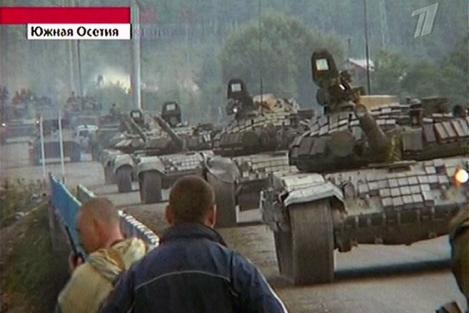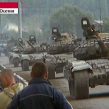
Russia Calls for Arms Embargo on Georgia After War’s Second Anniversary
Publication: Eurasia Daily Monitor Volume: 7 Issue: 157
By:

Marking the second anniversary of Russia’s “coercion-to-peace” operation in Georgia, the Russian Chief of the General Staff, Army-General Nikolai Makarov, told the media: “Arms deliveries to Georgia are in full swing. Georgia’s military potential is significantly higher today, compared to August 2008.” Makarov added reproachfully that Georgian soldiers are now gaining combat experience in Afghanistan (Interfax, August 8).
The claim about those arms deliveries is intended for a US and NATO audience. Makarov and the Russian government must know that this audience knows that their claim is false. The purpose of such statements is simply to draw, or reinforce, Moscow’s red lines regarding Western policies.
On August 7, Russia’s foreign ministry released a comprehensive document accusing the United States of violating international arms control agreements across the entire spectrum (strategic nuclear, tactical nuclear, conventional, chemical-biological, and others). The document’s section on small arms and light weapons (SALW) accuses the US of having delivered 18,400 rifles and carbines and 40 heavy machine guns to Georgia in 2008 (without specifying whether before or after August of that year). The Russian MFA alleges that such deliveries violate SALW control regulations as well as OSCE norms. These ban arms transfers to countries involved in armed conflict or in situations that pose risks of destabilization (Interfax, August 7).
The document goes so far as to challenge US military assistance to Israel, alleging that such assistance violates arms control agreements on a number of counts. This challenge seems directed at a core tenet of US foreign and security policy. It also seems unkind to Israel, after the latter had complied with Russian demands to stop deliveries of non-lethal defensive equipment to Georgia. Again, none of this is to be taken at face value, and all of it is retractable as might be expedient. The implicit message is that Russia would not cooperate with US or NATO arms control efforts, if Washington or Brussels seriously contemplate defense and security relationships with Georgia or other countries in Europe’s eastern neighborhood.
Challenging the US delivery of infantry weapons to Georgia is a new declarative twist to Russian policy. Russia had called for a total arms embargo on Georgia after the 2008 war, but it adopted a slightly more nuanced position by 2009. Foreign Minister, Sergei Lavrov, and other officials were saying publicly that delivery of infantry arms to Georgia was acceptable to Moscow, taking into account the Georgian troops’ mission in Afghanistan. The August 7 document from Moscow, however, seems to erase this nuance; as does Makarov’s reproachful comment about Georgians gaining combat experience in Afghanistan. Meanwhile, Georgia lacks basic defensive hardware and mentoring for homeland defense.
For their part, the US and NATO have remained silent on the second anniversary of Russia’s invasion of Georgia, a historic watershed event by general recognition. The official silence reflects not only caution toward Russia, but also an absence of lessons-learned processes in Washington and Brussels from 2008 to date. The US State Department had not planned to make any statement until spokesman P.J. Crowley responded to journalists’ prodding. He cited Secretary of State, Hillary Clinton’s, recent visit to Georgia, her declared support for Georgia’s territorial integrity, and her call to Russia to recognize its commitments under the armistice agreement. However, the spokesman refrained from using the term “occupation,” although Clinton had officially introduced that term during her Georgia visit, as the official expression of US policy henceforth. On August 11, the same spokesman had to play down the Russian S-300 deployment as not necessarily confirmed and not necessarily a new development. The US Ambassador in Tbilisi, John Bass, also omitted the word occupation from his statement on the S-300 deployment (Rustavi-2 TV, August 12; www.state.gov, August 9, 11).
NATO also keeps silent in the face of dramatic changes to the status-quo in the Black Sea-South Caucasus region in Russia’s favor in the last two years, accelerating this year. At its July 12 meeting, the North Atlantic Council decided in advance that there would be no meetings of the NATO-Georgia and NATO-Ukraine Commissions at the alliance’s Lisbon summit. Only the three Baltic States supported holding such meetings in keeping with previous practice. Possible arms deliveries to Russia as contemplated by several West European countries are not a topic for discussion among allies. Instead, it has been ruled out of the agenda, implying a green light for Western assistance to the “modernization” of Russia’s armed forces.
Meanwhile, Russian military power is entrenching and growing beyond Russia’s borders in the Black Sea-South Caucasus region, from Ukraine’s Crimea to Georgia’s occupied territories to Armenia (where an expanded agreement on Russian forces is due for signing this month). US and NATO over commitments in Iraq and Afghanistan (along with perceived need of Russian help on Iran) have opened this window of opportunity for Russian re-expansion in Europe’s East, and are still holding that window open.




